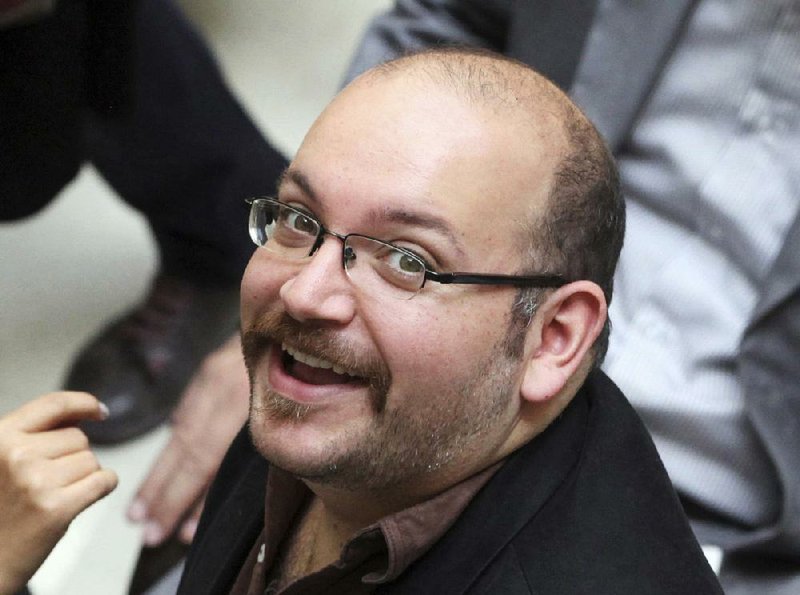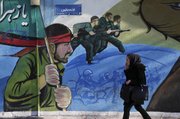VIENNA -- Iran said Saturday that it has released four detained Iranian-Americans in exchange for the release of seven people imprisoned or charged in the United States.
RELATED ARTICLE
http://www.arkansas…">Sanctions on Iran lifted
The officials said Washington Post correspondent Jason Rezaian, 39, was freed from Tehran's Evin Prison where he had been held for 18 months after he was convicted last year on vague charges of espionage and other alleged offenses. He was sentenced to an unspecified prison term.
He was to be flown out of the country with the three other released detainees on a Swiss plane.
The four were still in Iran today as arrangements progressed to get them out, said a senior U.S. official. Speaking on condition of anonymity, the official said efforts were underway to get the four together and on a plane out of Tehran.
Iran also agreed to let Rezaian's wife leave with him on the plane, the officials said. She had been briefly detained along with her husband, but was released and had been barred from leaving the country.
As part of the exchange, the United States is freeing seven people who were charged with violating sanctions against Iran, U.S. and Iranian officials said.
The U.S. has long sought the release of the detained Americans.
A senior U.S. administration official, speaking in Vienna, said the "Iranians wanted a good will gesture," which led to the exchange agreement. The Iranians submitted to U.S. authorities a list of people it wanted released. The list was "whittled down" to exclude any who had committed crimes related to violence or terrorism, said the official, one of several who spoke on condition of anonymity.
Another official called the exchange a "one-time arrangement ... to bring Americans home."
Obama administration officials said the exchange was made possible because of the new climate of diplomacy they have cultivated with Iran during the nuclear negotiations and after the nuclear agreement was finalized.
"They understood this was a priority for us, and that we'd never give it up," a senior administration official said about the release of the four prisoners. "We consistently said it was independent from the nuclear negotiations but of great importance to us."
U.S. officials said they had not wanted the detained Americans to be "used as leverage" in the nuclear negotiations. But, they said, completion of the nuclear deal last July greatly accelerated talks about the prisoners.
Kris Coratti, vice president of communications and spokesman for the Post, said late Saturday that "while we are hopeful, we have not received any official word of Jason's release."
The fifth American
A senior administration official identified the fifth American being released as Matthew Trevithick. "Matthew was a young man studying in Iran" and was "detained in recent months," the official said. "We wanted him obviously to be a direct part of this, and made clear to Iranians that [his release] would be an appropriate humanitarian gesture."
Trevithick's family said in a statement that he went to Iran in September for a four-month language program. He was arrested and spent 40 days in Evin Prison. A researcher and author, he previously worked at the American University of Afghanistan and the American University of Iraq.
U.S. Rep. Jared Huffman, D-Calif., who represents the district where the Rezaian family lives, said he was told by the White House that the Americans would be aboard a Swiss plane that would take them briefly to Switzerland and that they would not return home until they have "medical checkups," likely at a U.S. military medical facility in Germany.
"We're all very excited that hopefully within a matter of days we'll be able to welcome them back to the United States," Huffman said.
In a statement in Tehran, prosecutor Abbas Jaafari said that "based on an approval of the Supreme National Security Council and the general interests of the Islamic Republic, four Iranian prisoners with dual nationality were freed today within the framework of a prisoner swap deal," the semiofficial Fars News Agency reported.
The state-run Islamic Republic News Agency, quoting Jaafari, said the agreement also includes a provision under which the United States will no longer pursue the extradition of 14 Iranians alleged to have been involved in trafficking arms to Iran.
In the exchange, the State Department said clemency has been offered to seven Iranians, six of whom are dual U.S.-Iranian citizens, who had been convicted or awaiting trial in the United States. "The United States also removed any Interpol red notices and dismissed any charges against 14 Iranians for whom it was assessed that extradition requests were unlikely to be successful," the department said.
It's unclear if they will leave the U.S. for Iran. They are free to stay in the United States, officials said.
In addition to the Rezaians, those being freed Saturday in Iran were: Saeed Abedini, 35, of Boise, Idaho; Amir Hekmati, 32, of Flint, Mich.; and Nosratollah Khosravi-Roodsari, U.S. and Iranian officials said.
Abedini is a Christian pastor who had been imprisoned since July 2012 for organizing home churches in Iran. Hekmati is a former Marine who spent more than four years in prison on spying charges after his arrest in August 2011 during a visit to see his grandmother.
The detention of Khosravi-Roodsari had not been previously publicized. Iranian state television identified him as a businessman. Little else was known about him.
Not included in the exchange deal was Siamak Namazi, a Dubai-based oil company executive who had promoted closer U.S.-Iranian ties, Iranian officials said. He was arrested in October while visiting a friend in Tehran. In addition, the fate of former FBI agent Robert Levinson, who disappeared in March 2007 during a visit to Iran's Kish Island, remains unknown.
Namazi remains incarcerated because "his charges are financial, and not political," Fars said.
Asked about Namazi and Levinson, U.S. officials in Vienna said talks for their release are continuing. The U.S. officials were among world leaders who had gathered Saturday in Vienna in anticipation of the end of international sanctions against Iran in return for significantly curtailing its nuclear program.
A U.S. official in Washington said, Iran has "committed to continue cooperating with the United States to determine the whereabouts of Robert Levinson."
Political reaction
Republican presidential candidates Donald Trump and Ted Cruz, and U.S. House Speaker Paul Ryan gave cautious praise on the release of the prisoners, particularly Abedini, but said the four never should have been held in the first place.
Democratic presidential candidate Bernie Sanders called diplomacy the key to resolving the detainee issue, and Hillary Clinton welcomed the developments, while saying Iran should not be thanked because it should never have detained the Americans.
U.S. Sen. Tom Cotton, R-Ark., welcomed the Americans' return but criticized Obama for making the exchange.
"Today the four Americans who have been unjustly held in Iran are finally returning home, and we welcome them with open arms," Cotton said. "They and their families have been through unspeakable pain and suffering, and their freedom brings relief to not only them, but the entire country.
"But in our elation over their safe return we must be careful not to forget the dangerous circumstances of their release. President Obama has appeased Iran's terror-sponsoring ayatollahs, this time with a 'prisoner' swap to secure the overdue release of four innocent American hostages in return for which Iran gets seven lawfully convicted terrorists and criminals, fourteen terrorism prosecutions halted, $100 billion in sanctions relief, and an industrial-scale nuclear program -- and Iran gets to keep Americans Siamak Namazi and Robert Levinson to extract future concessions.
"While we exult in the return of American hostages, one must also wonder how many more Americans will be taken hostage in the future as a result of President Obama's shameful decision to negotiate with these terrorists," Cotton said.
Other candidates were equally critical, with a partial exception: Jeb Bush told reporters in New Hampshire that while he agrees "there isn't much symmetry" in the sets of prisoners that the two nations are exchanging, "I'm not being critical of the deal without knowing all the facts." But he went on to blast the Obama administration for "tripping all over itself" to protect the nuclear deal. "They're missing the larger point, which is that we need to confront the ambitions of Iran on a larger basis."
At a tea party event in South Carolina, former Arkansas Gov. Mike Huckabee questioned why the Obama administration agreed to talks with a country that was holding U.S. citizens. "It's great that these prisoners have been released," the Washington Post quoted Huckabee as telling reporters. "They should have been released before we ever sat down at the negotiating table."
Huffman, the Rezaians' congressman, called the remarks "shameful." He told the Post that Florida Sen. Marco Rubio and other Republicans "would have said the same things" no matter what the circumstances. "There are some critics of the administration that just can't acknowledge anything good that comes from this administration."
Fars named seven the Iranians it said were being exchanged by the United States in the deal: Nader Modanlo, Bahram Mechanic, Khosrow Afqahi, Arash Ghahreman, Touraj Faridi, Nima Golestaneh and Ali Sabounchi.
Golestaneh, 30, pleaded guilty last month to cyberhacking a U.S. defense firm in October 2012. He was arrested in Turkey in November 2013 and extradited to the United States in February 2015, the Justice Department said.
Absent from the list was Manssor Arbabsiar, an Iranian-American from Texas who pleaded guilty in 2012 to plotting to assassinate the Saudi ambassador to Washington, Adel al-Jubeir, who is now Saudi Arabia's foreign minister. Arbabsiar was sentenced to 25 years in prison.
Joel Androphy, a lawyer for three of the Iranians to be freed by U.S. authorities, said the Iranian Embassy told him that his three clients, who have been charged with sanctions violations but have not yet gone to trial, have been issued a pardon by President Barack Obama. The administration had no immediate comment.
Information for this article was contributed by Carol Morello, William Branigin, Karen DeYoung and Ellen Nakashima of The Washington Post; by Thomas Erdbrink, Rick Gladstone and David E. Sanger of The New York Times; by Bradley Klapper, Matthew Lee, Ali Akbar Dareini, Darlene Superville, Donna Cassata, Eric Tucker, Amy Anthony, Adam Schreck and George Jahn of The Associated Press; and by Kevin Cirilli, Derek Wallbank and Michael C. Bender of Bloomberg News.
A Section on 01/17/2016

